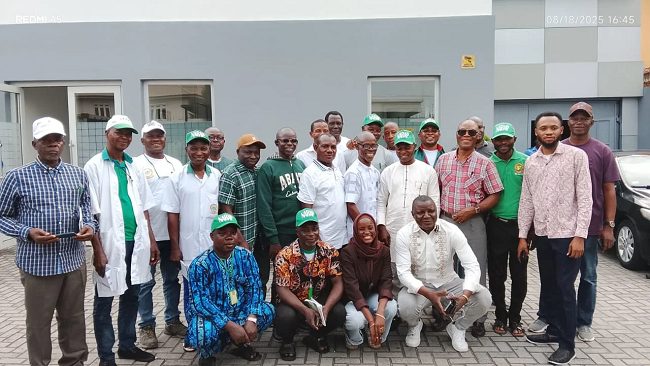The Federal Government through the Ozone Office of the Federal Ministry of Environment (FMOE) has reaffirmed its commitment to phasing out ozone-depleting substances by expanding training and certification programmes for refrigeration and air-conditioning (RAC) technicians nationwide.
The training was organised by the Ozone Office of the FMOE in partnership with the Sustainable Research and Action for Environmental Development (SRADeV Nigeria) with the support of the United Nations Development Programme (UNDP).

Speaking during the training session at Cool Plus Training Centre, Lagos, the Director/National Ozone Officer, Mr. Idris Abdullahi, highlighted Nigeria’s steady progress under the Multilateral Fund-supported Hydrochlorofluorocarbons Phase-Out Management Plan (HPMP) Stage II Project.
Represented by Mr. Nurudeen Mahmud, Assistant Chief Chemical Enginneer, Ozone Office, Abdullahi said the RAC sector remained a key focus, as hydrochlorofluorocarbons (HCFCs) – especially HCFC-22 – widely used as refrigerants in the servicing of cooling equipment.
According to him, the Federal Government is promoting a transition to hydrocarbon refrigerants, which are ozone- and climate-friendly alternatives to HCFCs.
He, however, emphasised that the safe handling and professional certification of technicians were critical due to their flammable nature.
“With support from the Multilateral Fund of the Montreal Protocol and in collaboration with UNDP, we have upgraded over 20 training centres nationwide – including in Lagos, Port Harcourt, and Kano – with modern tools and equipment.
“This is to enable us to train and certify RAC technicians on the safe use of hydrocarbon refrigerants,” Abdullahi said.
He noted that only technicians who meet professional and safety standards would be certified.
He said the training was designed to reduce fire hazards, ensure compliance with international standards, and strengthen Nigeria’s transition to environmentally sustainable cooling solutions.
He reaffirmed the ministry’s long-standing partnership with the National Association of Refrigeration and Air-conditioning Practitioners (NARAP) and local collaborators such as SRADeV Nigeria.
He added that the cooperation between government, private sector, and professional associations remains vital to achieving Nigeria’s obligations under multilateral environmental agreements.
The Executive Director of SREDeV Nigeria, Dr Leslie Adogame, in a goodwill message, stressed the importance of technicians in the sector.
Adogame was represented at the event by the Programmes and Project Officer, Mr. Olumide Ogunleye.
“Technicians are at the heart of this transformation. Your expertise directly impacts the performance, safety, and environmental outcomes of cooling systems.
“This workshop is more than a technical session – it is a cornerstone in building national capacity and strengthening Nigeria’s commitment to sustainability.
“Without trained and certified technicians, the shift to low-global warming potential refrigerants cannot be achieved safely or effectively,” Adogame said.
He commended the Federal Ninistry of Environment and partners for supporting technicians with the skills needed to implement the Kigali Amendment to the Montreal Protocol.
He urged the Federal Government to integrate trained and certified technicians into decision-making processes while professionalising the RAC sector in Nigeria.
Also speaking, Comrade Ahmed Ibrahim, NARAP National President, represented by the Secretary-General, Mr. Wasiu Abiodun, said the certification programme came at the right time.
“Our members are fully committed to aligning with global best practices and Nigeria’s national plan to phase out ozone-depleting substances.
“Safety is paramount in our profession – we handle flammable refrigerants and electrical equipment daily. This training reinforces the need for safety first,” Ibrahim said.
Also, the Lagos State Coordinator of NARAP, Mr. Okelola Abiodun, described the training as an important step in improving efficiency and professionalism across the industry.
“The future is bright because the quality of training and certification we are receiving will transform our practice and strengthen compliance with international environmental standards,” Abiodun said.
The workshop ended with renewed commitments from technicians, government, and professional bodies to deepen collaboration, enhance public awareness, and ensure that Nigeria’s RAC sector transitions safely and sustainably towards ozone- and climate-friendly technologies.
By Fabian Ekeruche
